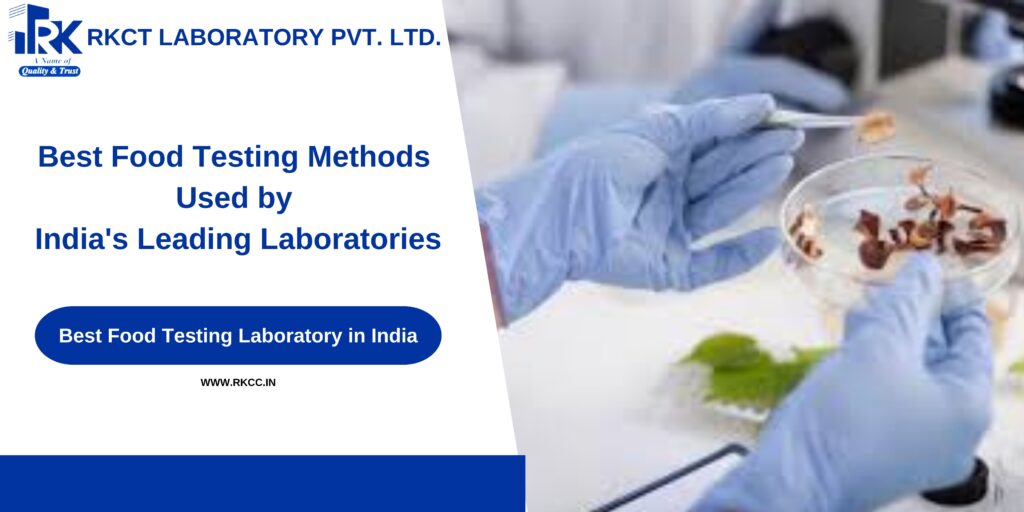Food safety and quality control are essential to ensure that the food we consume is free from harmful contaminants, adulterants, and meets regulatory standards. Food testing laboratories in India, including RKCT Laboratory, use advanced scientific techniques to detect microbial, chemical, and physical hazards in food products. These methods comply with IS (Indian Standards), FSSAI, and NABL guidelines, making food safer for consumption.
Importance of Food Testing in India
Food testing is essential because:
✅ It ensures food safety and prevents contamination
✅ It identifies adulterants and harmful substances
✅ It checks nutritional value and label accuracy
✅ It helps meet FSSAI & IS regulatory requirements
✅ It builds consumer trust and ensures legal compliance
To achieve these goals, food testing labs like RKCT Laboratory use scientifically validated methods to analyze food samples.
Best Food Testing Methods Used in India
1️⃣ Microbiological Testing
- Detects bacteria, fungi, and viruses that can cause foodborne illnesses.
- Common pathogens tested: E. coli, Salmonella, Listeria, Staphylococcus, Yeast & Molds.
- Used for: Dairy, meat, seafood, ready-to-eat food, beverages.
📌 IS Standard Code: IS 5887:1976 (Microbiological testing for food safety)
2️⃣ Chemical Contaminant Testing
- Identifies pesticide residues, heavy metals, aflatoxins, and preservatives.
- Ensures food does not contain harmful chemicals exceeding safe limits.
- Used for: Fruits, vegetables, grains, spices, oils, packaged food.
📌 IS Standard Code: IS 13864:1993 (Pesticide residue testing), IS 15303:2003 (Heavy metals testing)
3️⃣ Food Adulteration Testing
- Detects common food adulterants such as:
✅ Milk – Urea, detergent, starch (IS 1479:1961)
✅ Tea & Coffee – Artificial color, iron fillings
✅ Spices – Lead chromate, artificial dyes
✅ Edible Oils – Argemone oil, mineral oil (IS 4701:1981)
4️⃣ Nutritional Analysis
- Determines protein, carbohydrates, fats, vitamins, minerals, and calorie content.
- Helps verify nutrition labels on food packaging.
- Used for: Bakery, dairy, snacks, cereals, supplements.
📌 IS Standard Code: IS 1656:2007 (Food nutrient analysis)
5️⃣ Shelf-Life & Stability Testing
- Determines the expiry date and storage conditions for food products.
- Checks for microbial growth, nutrient degradation, packaging stability.
📌 IS Standard Code: IS 16471:2017 (Shelf-life testing of food products)
6️⃣ Packaged Drinking Water Testing
- Ensures bottled and packaged water meets safety and purity standards.
- Tests for pH, TDS (Total Dissolved Solids), heavy metals, and microbial contaminants.
📌 IS Standard Code: IS 10500:2012 (Safe drinking water standards)
7️⃣ Allergen Testing
- Detects gluten, nuts, dairy, soy, and other common allergens.
- Prevents allergic reactions and ensures proper labeling.
📌 IS Standard Code: IS 16182:2014 (Food allergen testing)
8️⃣ Meat, Poultry & Seafood Testing
- Ensures freshness, hygiene, and quality of meat and fish.
- Tests for bacterial contamination, antibiotic residues, preservatives.
📌 IS Standard Code: IS 16471:2017 (Meat & poultry testing)
9️⃣ Fats & Oils Testing
- Measures fat content, rancidity, trans fat, and purity of oils and fats.
- Used for: Cooking oils, butter, margarine, ghee.
📌 IS Standard Code: IS 548:1990 (Testing of edible fats and oils)
🔟 Genetically Modified Organism (GMO) Testing
- Detects genetically modified ingredients in food products.
- Ensures compliance with FSSAI and export regulations.
📌 IS Standard Code: IS 17088:2018 (GMO detection in food)
IS Standard Codes Followed at RKCT Laboratory
RKCT Laboratory ensures strict compliance with the following Indian Standards (IS) codes for food safety:
📌 IS 10033:1981 – Food preservatives testing
📌 IS 1479:1961 – Milk adulteration detection
📌 IS 4701:1981 – Vegetable oil quality testing
📌 IS 10500:2012 – Drinking water safety testing
📌 IS 16182:2014 – Food allergen testing
These standards ensure food products meet national and international safety guidelines.
Conclusion
Food testing is essential for public health, quality control, and legal compliance. RKCT Laboratory provides advanced food testing services in India, following FSSAI, NABL, and IS standard codes.
📞 For reliable food testing, contact RKCT Laboratory today!
Need Help?
FAQs
Q1. Why is food testing necessary?
✅ Food testing ensures that food is free from contaminants, safe to eat, and complies with legal standards.
Q2. What are the main types of food contaminants?
✅ Food contaminants include bacteria (E. coli, Salmonella), chemicals (pesticides, heavy metals), adulterants (urea, starch), and allergens (gluten, nuts).
Q3. Which is the best laboratory for food testing in India?
✅ RKCT Laboratory is one of the best food testing laboratories in India, offering FSSAI-approved, NABL-certified testing services for food safety and quality control.
Q4. How long does food testing take?
✅ The duration varies:
- Basic tests: 24-48 hours
- Chemical & microbiological tests: 5-7 days
Q5. How can I get my food tested at Laboratory?
✅ You can visit the Laboratory, submit your sample, and receive a detailed analysis report on food safety and quality.




